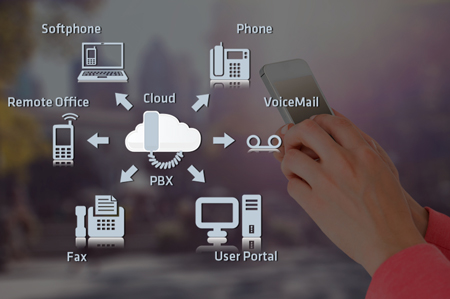-
Your shopping cart is empty!

Should Your Business Switch to VoIP/ Cloud Office Phone Solution?
You're at an internet café and get an important business call--on your laptop. You're on the road and receive an urgent voice mail--in your e-mail inbox. Your business has a phone number with a Singapore area code--even though your office is in Kuala Lumpur.
Welcome to the world of voice over internet protocol (VoIP). With VoIP service, your phone calls travel over the internet as data, just as e-mail does. This type of service can dramatically lower your telecommunications costs while increasing your productivity. It also provides useful features and capabilities that conventional phone technology can't offer.
Though VoIP is quickly gaining popularity, some small businesses are still on the side-lines, concerned that VoIP audio quality is substandard, that the technology is difficult or costly to implement, or that their phone service will be interrupted if their electricity goes out.
The truth is, VoIP's benefits far outweigh any potential drawbacks. Here's what you need to know about VoIP to decide if it's right for your business--plus tips for making the most out of VoIP service.
1. Since its inception, the quality of VoIP service has come a long way. Early VoIP products required both parties in a conversation to be at a computer. Not only was this extremely limiting, but the sound quality was often poor. Today's VoIP service has evolved and allows you to make and receive calls using standard phones or, even better, feature-rich IP phones. Sound quality has vastly improved, too--in fact, many businesses today have abandoned traditional phone systems in favor of VoIP. Many of these businesses have the ability to leverage their own data network to carry phone calls originating and terminating within their office with additional savings and benefits.
2. Using VoIP can significantly reduce your telecommunications costs. Operating costs for VoIP service providers are significantly lower than for traditional phone companies, which must contend with the existing, expensive-to-maintain phone infrastructure and costly industry regulations. With lower expenses, VoIP providers can charge much less than their competitors.
And with VoIP, businesses no longer have to maintain separate networks for phones and data--another significant money saver. Also, the costs associated with employee moves, adds and changes--which can cost RM100 or more per occurrence--are virtually eliminated. All you have to do is move your IP phone (or traditional phone with a VoIP adapter) to a different broadband network jack and plug it in.
3. VoIP service makes your phone system highly flexible. VoIP systems allow you to do things that are simply not possible with traditional phone technology. For example, you can:
With all the benefits VoIP has to offer, if you're now considering a switch to VoIP service, these tips will help you overcome any potential hurdles and make the most of a VoIP system:
One thing's for sure: VoIP technology is continually evolving, with compelling new benefits being developed for small businesses. For example, some new wireless android/IOS combination devices allow you to use your VoIP service whenever you're near a Wi-Fi network and use your cell phone service when you're not. Among the advantages: a dramatic increase in mobility and a sharp decrease in your cell phone charges.
For larger small businesses, having a single IP network for both voice and data can provide other advantages, too. For example, an IP network can also support real-time, high-quality, affordable videoconferencing, call center applications and more.
No matter the size of your business, VoIP is a surprisingly flexible, affordable technology that offers the same, sophisticated communication tools your enterprise-size competitors have.
Reference from entrepreneur.com